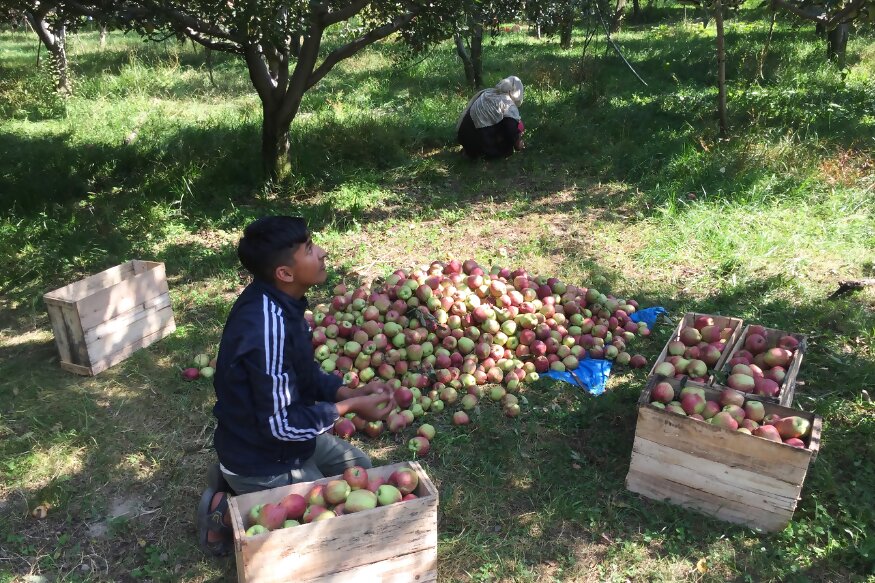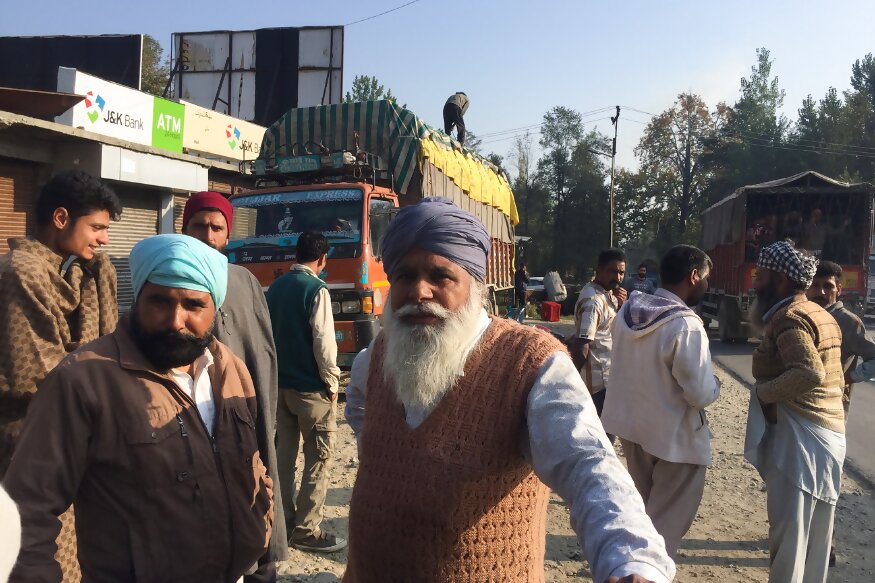
views
Shopian: Kulwant Singh, 45, has been travelling to Kashmir for over two decades. Originally from Gagomal, a small village of Amritsar in Punjab, Singh eagerly waits for October every year – the height of apple picking season in the Valley – and the most profitable time for him.
“From September to December I travel to Kashmir, load apples and dispatch them to different cities of the country,” Singh said. But what used to be the best season for trade has turned into a nightmare for him this year.
Since the last two days, Singh and about a dozen other drivers have parked their trucks near an army garrison in Hawal area of Shopian, failing to find a single apple consignment.
In one of the world's largest apple-growing regions, a lockdown imposed after the government dramatically abolished the state's special constitutional status has cut transport links with buyers in India and abroad, plunging the industry into turmoil.
The fatal shooting of truck driver from Rajasthan in Shopian by two suspected militants on Monday evening – the first of the three civilian killings in Kashmir in less than two days – has further provoked fear and panic among the apple traders in the Valley.
In Monday night’s attack, two masked militants reportedly attacked the trader as he was loading his truck with apples in the nearby Sandoo village. The gunmen shot the driver after forcing him to drive away from the village and towards the Shopian-Srinagar road.
According to the family of Shakeel Ahmad – the resident at whose house the truck was getting loaded – the conductor of the truck came back running. “He was drenched in tears as he told us that two masked gunmen barged into the truck and drove it away,” says Mohammad Yousuf. He, along with others immediately dashed outside to find the vehicle speeding towards the main road. “The silence was shattered by the sound of gunshots.”
The militants shot the driver, identified as Shareef Khan and then set the truck on fire.
Two days later on Wednesday, suspected militants gunned down a labourer from Chhattisgarh in Pulwama district. Hours later, another apple trader from Punjab was found shot dead in Shopian district.

The incident occurred just hours after authorities had restored the postpaid cellular services that were suspended along with telephone and internet connections after a communications blackout was imposed in the Valley. Khan became the first non-local civilian causality in Kashmir after the August 5 decision.
Less than 48 hours later, the second murder happened. In a cold-blooded attack, a labourer working at a brick-klin in Nehama Kakapora area of Pulwama district, was shot dead by suspected militants fuelling fears that now, the non-locals might become the prime target of militant’s campaign of threat and violence.
The deceased laborer was identified as Sethi Kumar Sagar, a resident of Chhattisgarh. According to a staffer at the factory, Kumar and others had already been warned by the owner not to venture out without permission due to the prevailing security threat.
“He left with a colleague without taking permission,” he said. The area where the shooting took place was taken under cordon by the forces and a search operation was launched.
When Kashmir was stripped of its special status, most of the migrant workers fled from the Valley as panic over the government’s move permeated every circle. With the recent murders in South Kashmir, those who thought of returning now fear for their lives.
The killings have sent the ailing apple markets – the lifeblood of Kashmir’s economy -- involving around half of the population of the state in a tailspin. “We are dependent on transporters from other states for exports. But now, everyone is more afraid than ever, “said Mohammad Ashraf Wani, president of Fruit Mandi, Shopian. “With no one to come and get them, our apples will rot,” he said.
The Shopian apple market has about 215 locally-owned trucks. “ However, at this time of the year, we need 8,000 trucks,” Wani said.

Back in Singh’s village in Punjab, about 90 of the 100 truck drivers would drive down to Kashmir to ferry the apples every year. “This time the number has gone down to 20,” he said.
“I have never felt so insecure in Kashmir, this place has changed,” said Singh, who claims that the hospitality of Kashmiris always made him return to the Valley. “But this time, I fear for my life.”
Farmers and fruit traders say the clampdown has already stopped them from either getting their produce to market or shipping it out to the rest of India. The rising threats from militants has resulted in a further shortage of labour and rising transport costs.
“There is sixty percent increase in the fare this time,” Wani said. Last year, Wani would pay Rs 100 for an apple box exported to Bangalore, but this time he is willing to shell out Rs 170.
The costs of packing and apple plucking has also increased. “Last year, we would pay rupees 550 a day to the apple packers but this year the cost has gone up to Rs 900 rupees a day,” said Wani. Since August 5, the fruit madi of Shopian which usually records an annual business of over nine crore, is shut. There are no traders and the business is happening inside orchards, covertly.
Singh says that he will wait for another day to find a consignment. “If the situation remains the same, this will be my last visit to Kashmir,” he said.


















Comments
0 comment